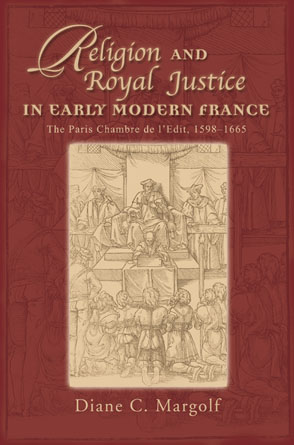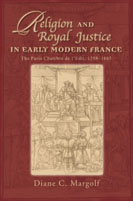
Religion and Royal Justice in Early Modern France
The Paris Chambre de l’Edit, 1598–1665
Diane C. Margolf
Religion and Royal Justice in Early Modern France
The Paris Chambre de l’Edit, 1598–1665
Diane C. Margolf
“This is the first book to try to examine and explain in a systematic way why the royal justice system was never able to protect the interests of French Huguenots after 1598, as the Edict of Nantes implied it would do. Basing her research on the records of the Chambre de l’Edit in Paris, Diane Margolf offers a great deal of insight into the practical limitations of the Edict of Nantes and why it could never be the guarantor of religious freedom that some Huguenots had hoped for.”
- Description
- Reviews
- Table of Contents
“This is the first book to try to examine and explain in a systematic way why the royal justice system was never able to protect the interests of French Huguenots after 1598, as the Edict of Nantes implied it would do. Basing her research on the records of the Chambre de l’Edit in Paris, Diane Margolf offers a great deal of insight into the practical limitations of the Edict of Nantes and why it could never be the guarantor of religious freedom that some Huguenots had hoped for.”
“This book offers a careful archival investigation of the most important judicial institution created by the Edict of Nantes that reveals for the first time what the Paris Chambre de l’Edit actually did. It is just the kind of study we need more of in order to understand the everyday realities of religious coexistence and its regulation in early modern Europe.”
“Margolf brings to life not only the religion and royal justice of her title, but also provides insights on seventeenth-century rural and urban family and community life. [This volume] stands out as yet another fine volume in the Sixteenth Century Essays & Studies series.”
“This is important reading for any scholarly or early modern French history and should certainly interest anyone concerned about the long-term effects of religious violence upon society.”
“Margolf offers a fascinating and well-documented study of the bipartisan chamber from its inception to its revocation in 1685 under Louis XIV.”
“The meat of this study is an analysis of 3,600 interlocutory judgments and definitive sentences issued by the Paris court’s criminal chamber in its attempts to rebuild civil society.… The requirement to render justice with equity had to be balanced with the grievances and dissension caused by a too rigorous application of the law. Peace required compromise and a commitment to collective amnesia—“the remedy of wise forgetfulness” as the edict put it—as well as punishment. Margolf shows how this was achieved with well-chosen case studies that do not clog the narrative flow. She reveals both the tensions and the success of a society embarking on an innovative project of confessional coexistence.”
Acknowledgments
Introduction
“Le Port de Salut et repos de cet etat”
Huguenots & the Law in Seventeenth-Century France
“Our processes are judged by the ticket on the bagges”
Magistrates, Litigants, & the Paris Chambre de l’Edit
“Le remède de la sage oubliance”
Memory, Litigation, & the Paris Chambre de l’Edit
“Comme père commun de tous nos sujets”
The Family, the Law, & the Paris Chambre de l’Edit
“Que la force demeure au roi et à la justice”
Violence, Punishment, & Public Peace
“An annihilation of justice”
The Huguenots & the Law Revisited
Bibliography
Index
Mailing List
Subscribe to our mailing list and be notified about new titles, journals and catalogs.



